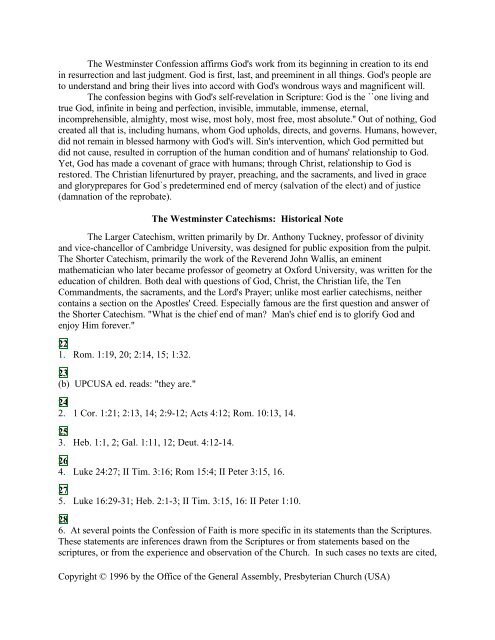The Book of Confessions - The Presbyterian Leader
The Book of Confessions - The Presbyterian Leader
The Book of Confessions - The Presbyterian Leader
You also want an ePaper? Increase the reach of your titles
YUMPU automatically turns print PDFs into web optimized ePapers that Google loves.
<strong>The</strong> Westminster Confession affirms God's work from its beginning in creation to its end<br />
in resurrection and last judgment. God is first, last, and preeminent in all things. God's people are<br />
to understand and bring their lives into accord with God's wondrous ways and magnificent will.<br />
<strong>The</strong> confession begins with God's self-revelation in Scripture: God is the ``one living and<br />
true God, infinite in being and perfection, invisible, immutable, immense, eternal,<br />
incomprehensible, almighty, most wise, most holy, most free, most absolute.'' Out <strong>of</strong> nothing, God<br />
created all that is, including humans, whom God upholds, directs, and governs. Humans, however,<br />
did not remain in blessed harmony with God's will. Sin's intervention, which God permitted but<br />
did not cause, resulted in corruption <strong>of</strong> the human condition and <strong>of</strong> humans' relationship to God.<br />
Yet, God has made a covenant <strong>of</strong> grace with humans; through Christ, relationship to God is<br />
restored. <strong>The</strong> Christian lifenurtured by prayer, preaching, and the sacraments, and lived in grace<br />
and gloryprepares for God`s predetermined end <strong>of</strong> mercy (salvation <strong>of</strong> the elect) and <strong>of</strong> justice<br />
(damnation <strong>of</strong> the reprobate).<br />
<strong>The</strong> Westminster Catechisms: Historical Note<br />
<strong>The</strong> Larger Catechism, written primarily by Dr. Anthony Tuckney, pr<strong>of</strong>essor <strong>of</strong> divinity<br />
and vice-chancellor <strong>of</strong> Cambridge University, was designed for public exposition from the pulpit.<br />
<strong>The</strong> Shorter Catechism, primarily the work <strong>of</strong> the Reverend John Wallis, an eminent<br />
mathematician who later became pr<strong>of</strong>essor <strong>of</strong> geometry at Oxford University, was written for the<br />
education <strong>of</strong> children. Both deal with questions <strong>of</strong> God, Christ, the Christian life, the Ten<br />
Commandments, the sacraments, and the Lord's Prayer; unlike most earlier catechisms, neither<br />
contains a section on the Apostles' Creed. Especially famous are the first question and answer <strong>of</strong><br />
the Shorter Catechism. "What is the chief end <strong>of</strong> man? Man's chief end is to glorify God and<br />
enjoy Him forever."<br />
22<br />
1. Rom. 1:19, 20; 2:14, 15; 1:32.<br />
23<br />
(b) UPCUSA ed. reads: "they are."<br />
24<br />
2. 1 Cor. 1:21; 2:13, 14; 2:9-12; Acts 4:12; Rom. 10:13, 14.<br />
25<br />
3. Heb. 1:1, 2; Gal. 1:11, 12; Deut. 4:12-14.<br />
26<br />
4. Luke 24:27; II Tim. 3:16; Rom 15:4; II Peter 3:15, 16.<br />
27<br />
5. Luke 16:29-31; Heb. 2:1-3; II Tim. 3:15, 16: II Peter 1:10.<br />
28<br />
6. At several points the Confession <strong>of</strong> Faith is more specific in its statements than the Scriptures.<br />
<strong>The</strong>se statements are inferences drawn from the Scriptures or from statements based on the<br />
scriptures, or from the experience and observation <strong>of</strong> the Church. In such cases no texts are cited,<br />
Copyright © 1996 by the Office <strong>of</strong> the General Assembly, <strong>Presbyterian</strong> Church (USA)




